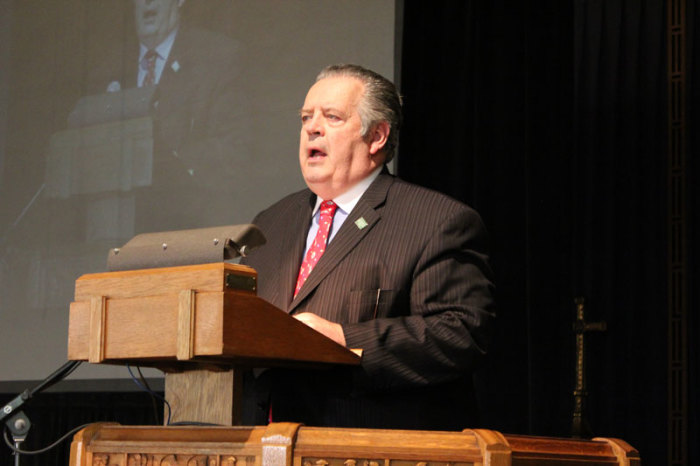Are Southern Baptist Calvinists Just Misunderstood? Richard Land Responds

Richard Land, president of Southern Evangelical Seminary in Matthews, North Carolina and former head of the Ethics and Religious Liberty Commission of the Southern Baptist Convention, is disputing the charge that traditionalists simply do not understand Reformed theology.
"The underlying assumption there is that if we understood it, we would be Calvinists," Land said in a recent phone interview with The Christian Post. "And the fact that we're not Calvinists is our fault because we don't understand it."
The Calvinism, or Reformed theology, debate is over the roles of God's sovereignty and human free will in determining who will accept God's saving grace and follow Christ as their Lord and Savior. Most Southern Baptists lie somewhere between the extremes of that spectrum.
In a recent CP interview, James Forbis, a millennial Calvinist currently enrolled at The Southern Baptist Theological Seminary in Louisville, Kentucky argued that most people within the SBC who object to Calvinism do not understand it. He and other young Southern Baptists, among whom Reformed theology is surging, often retreat to Calvinist enclaves outside their denomination because they do not feel as welcome within their denomination's annual meeting, he said.
When asked about that, Land, who is also CP's executive editor, responded, "I understand Calvinism. I've read all of Calvin's commentaries and I've read the Institutes. I've read the Synod of Dordt's Confession, I've read the Westminster Confession. I understand Calvinism, I just don't think it's right."
Forbis noted that among his teachers at SBTS, which is famous for being the Reformed seminary within the SBC, that some professors have told him privately that they are not full 5-point Calvinists but 3 to 4 pointers.
Land argued, "The distinction between a four-point Calvinist and a five-point Calvinist is a distinction without a difference. Because neither a four-point nor a five point Calvinist can say to every person they meet 'God loves you, Jesus died for you, and God has a wonderful plan for your life.' And that's what I believe the Bible says from Genesis through the end of Revelation."
Land describes himself as at "3.25 point Calvinist," because, regarding the five points of Calvinism using the acronym TULIP, he believes 3/4 of T (total depravity), 3/4 of U (unconditional election), none of L (limited atonement), 3/4 of I (irresistible grace), and all of P (perseverence of the saints). (You can read more about Land's view here.)
Part of the disagreement within the Southern Baptist Convention is occurring over what theological orientation Southern Baptists have believed historically. To Land, it is indisputable.
In 2010, Land contributed a chapter to the book Whosoever Will: A Biblical-Theological Critique of Five-Point Calvinism, a compilation of essays from Baptist leaders addressing their theological objections to Calvinism. As he addressed unconditional election, the U in Calvin's famous TULIP, he noted that the birth of the Southern Baptist theological tradition has indelible roots in the Sandy Creek revivals that took place in North Carolina in the 1750s.
These Sandy Creek Baptists were known at the Separate Baptists whose views mirror what is referred to as the "traditionalist" perspective within the Southern Baptist Convention today. While Baptists had been theologically diverse, by the time the SBC was formally established in 1845, their Sandy Creek Baptists far outnumbered those in the Charleston tradition, also known as Regular Baptists, who were distinctly Calvinistic in their theology.
"If you sent the collective DNA of Southern Baptists off to Ancestry.com for analysis the report you got back would say 85 to 90 percent Sandy Creek and 10 percent Charleston tradition and the rest a smattering of other influences ... the question of what Southern Baptists have been is a settled fact," Land told CP.
CP asked Land what he believes it will take for this theological division to be healed.
"I think it is going to take an acceptance by the Calvinists that the traditionalists are not going away and they are not going to accept minority status in Southern Baptist life," adding that the subject need not divide Southern Baptists.
"As long as Calvinists are willing to live with diversity on this issue, then there is no reason Southern Baptists can't continue to flourish, and flourish in unity. But they will have to accept that diversity. And they will have to quit implying that people who aren't Calvinists aren't quite right," he said.
Nevertheless, Land emphasized, "the issue being debated here between Calvinists and traditionalists is 'What does the Bible say?' That's a very different issue than the one we had in the 70s over inerrancy, which was 'What is the Bible?' We agree with our Calvinist brothers that the Bible is the inerrant, infallible Word of God and has truth without any mixture of error for its matter."
"That gives us a solid foundation to build Christian unity upon that we never can with the moderates and the liberals," he concluded.




























